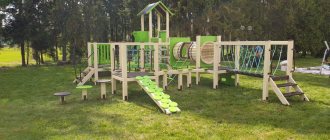"Ryuhi"
Before I explain to you the rules of this ancient game, I’ll tell you what ryukha is. Ryuha is a piece of wood. In order to make a ripple, you need to cut a thin log into pieces 20 centimeters long. The larger the ripple, the more interesting it is.
Also, for the game you will need at least two sticks with a diameter of approximately 5 cm and a length of approximately 1 meter.
Everyone who wants to play is divided into two teams. Each team draws a square measuring 1.5 x 1.5 meters on sand or asphalt. And in these squares, each team builds its own city. He makes various figures from ryukh. It is important that the squares are located on the same side, this is for safety.
The horse line is also drawn. This is the line behind which the teams will be located, and because of which they will throw long sticks trying to destroy the enemy’s city and knock all the creatures out of the drawn squares. This is an eco-game. All equipment is environmentally friendly! Yes, and children spend time outdoors.
Again the question arises: “Where can I get ryukhi?” Residents of rural areas have a chance to acquire them; they are lucky. What should city kids do? Well, of course, replace the game of “ryukhi” with the game of “towns”.
Russian folk rhymes
The squirrels were treated to hares and carrots were served. We ate all the nuts ourselves. And they told you to drive! - Stork-stork, stork-bird, What do you dream about at night? I want the swamp edges, - And also? More frogs. You can't catch them, you can't catch them. That's it, you drive! We're going to play. Well, who should start? One, two, three - You start driving! The gnome was looking for gold and lost his cap! He sat down and cried: “What can I do?!” Come out! You should drive!
The one who pronounces the counting rhyme, with each word, and sometimes syllable, touches the players in turn with his hand, not excluding himself. Who gets the last word? He becomes the driver.
If there are many participants in the game. Then we think differently: the children say a counting rhyme, and whoever gets the last word leaves the circle, and the counting rhyme is repeated until only one player remains.
An apple is rolling down a steep mountain. Whoever raises it, leave! A suitcase was floating on the sea, There was a sofa in the suitcase, An elephant was riding on the sofa. If you don't believe it, get out!
Often in games, all participants are divided into 2 teams, and you need to decide which of them will start the game. In this case, two players, one from each team, measure themselves against a stick (“contest”). To do this, we took a stick 40-50 cm long, one of the players takes it by the end, the other, pressing his hand tightly to the hand of his peer, grabs it higher, then the first moves his hand higher than the hand of the second, etc. Whichever player grabs the end of the stick wins the right to start the game on his team.
There is an easier way to select the order - guessing in which hand the object is located? Whoever guesses right gets to start first.
To divide the children into teams equally so that no one would be offended, we used agreements. The players are divided into pairs, step aside and conspire among themselves. It is necessary to negotiate quietly so that the presenters do not hear. Then the children go to the presenters and ask who they choose, often in the form of a rhyme, for example:
Who do you choose: A black horse or a golden collar? Should I roll the balls or drink the water? What will you take: a ruff from a river or a hedgehog from a forest? A gray duck or a wooden pipe? Who will you invite to visit: a mustachioed cockroach or a striped tiger cub?
Collusions are not difficult to form; as they worked, the children began to come up with them themselves. To prevent children from arguing before the game about who should drive or who should start the game, we used lots. The lot can be any stick (paper), which the drawer hides behind his back and says the words: “Whoever draws the lot, let him lead!”
"Lapti"
Another game that is perfect for schoolchildren.
On the playground, a large circle is drawn with chalk on the asphalt or with a stick in the sand. The leader stands in the circle. And all other players are located outside the circle.
The players turn their backs to the leader, take off one bast shoe at a time and, at a signal, over their heads, without looking, throw the bast shoes into the circle.
Then they turn around, look where their bast shoe fell, and try to pick up this bast shoe. The leader interferes with them. Trying to dirty, tarnish the players. There could be more presenters, it would be even more interesting. Leaders can only salvage players when they are within the circle.
Those who manage to rescue their shoes from the vicious circle “with impunity” win. Well, the one who gets greased first becomes the leader.
The main question: “Where can I get bast shoes?” Answer: “There’s nowhere to get bast shoes!” But the lack of bast shoes among modern schoolchildren is not a reason not to play. You can replace the bast shoes with something. You don’t even have to take off your sandals and sneakers. It is not recommended to use stones instead of bast shoes. Because you can injure the presenter.
I was thinking that the equipment for this game could be made from an old sock that has long since lost its pair. Stuff the sock with some scraps of fabric or padding polyester and tie. And here’s a wonderful substitute for lap shoes!
Russian folk barkers before the start of the game
I’m melting, melting, I’m flying into the game, I’m inviting you all, but I won’t tell you which one! I'll tell you the barker. Whoever is late flies into the sky. Tai, Tai, fly in. Have fun and play! We accept everyone into the game and don’t offend anyone. It's time to play Cheerful children Let our laughter sound around Get together in a circle! I invite the kids to a fun game, and whoever we don’t accept, we’ll lift by the ears. The ears will be red. So beautiful before.
In any Russian game there is always a driver or presenter. There are usually many people willing to play this role, but you need to choose one, sometimes two, which is what counting rhymes and tongue twisters are used for.
Children love humorous, funny counting poems and quickly remember them. All participants stand in a circle, in a row, and one of them goes to the middle, loudly. Pronouncing the words clearly, he recites a rhyme, for example:
"Towns"
First, a small lyrical digression. About 8 years ago, when my husband was actively involved in organizing various holidays, and I was helping him, we organized a corporate party on the occasion of the anniversary of a small company. The holiday was themed, on the theme of sports. That is, the host of the party was also the head coach, and everyone present at the celebration were, like, athletes.
We then arranged many different sports locations, fortunately the location allowed, since we held the entire event outdoors. And one of the locations was dedicated to the game of gorodki. She was the most popular. Adults frolicked like children with these bats and tried to hit the wooden cylinders arranged in various shapes. And when it worked out, the joy knew no bounds!
If adults were so carried away, then how should school-age children react to this game?
And if it’s difficult to get ruffles these days, then I think there won’t be any problems with sets for towns.
I am sure that you are familiar with the rules of the game in small towns. Therefore, I’ll just remind you what shapes can be made from small wooden sticks, which, by the way, are called towns.
"Burners"
Another ancient beautiful and interesting game. The game has one leader and many players. Players become pairs and line up behind each other. Or rather, pair after pair. The leader stands with his back to them at a distance of two steps from the first couple.
The last pair of players unclenches their hands, runs around the column of players on both sides and tries to stand first. But the presenter interferes with them; his task is to tarnish one person from the couple. If he succeeds, then he stands first in the column along with the greasy player. And the player left without a pair becomes the leader. If the players manage to grab hands before the leader greases them, then they become the first, and the game continues.
The host cannot spy on the players. He should stand with his back to them and look forward. But, as they say, it is better to see once than to hear a hundred times.
The usefulness of folk games
Caring parents, aware of their busyness and inability to fully communicate with their child, try to surround him with a variety of toys. This is good, since the baby should have the opportunity to explore the world around him through the toy. But, more often than not, everything ends with the purchase of toys because adults consider their mission completed. Meanwhile, for a preschooler to play, he must be taught to do so. When a baby can play independently, then he will not need a large number of toys.
What are the best games to offer to children? How to find a game that will unite an adult and a child? Russian folk games will help solve these questions. They have been selected for centuries, and the most beloved and popular ones have come down to us, which are easy to organize in any setting: on vacation, at home. The time has come for modern parents to find out what games their great-grandfathers played and how they are useful for our children.




